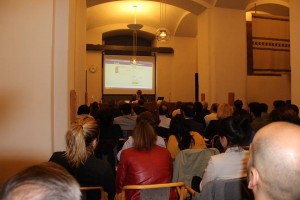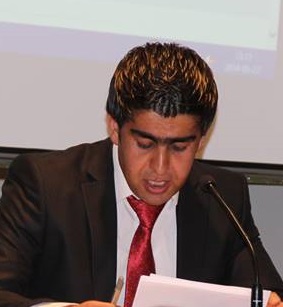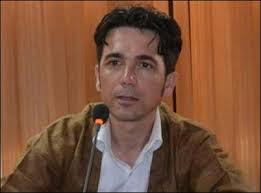By Kamal Chomani:
This is the text of a speech today by independent journalist Kamal Chomani to a meeting held at the Swedish Parliament about human rights and press freedom, organised by Swedish MP Amine Kakabaveh, the 17th February Group and the NINA center:
Thank you so much for this honor. I feel terribly humbled to address here in Sweden Parliament which has always been defending human rights and freedom of speech in our country. I would like to extend my thanks to Amineh Kakabaweh who has always been supportive to bringing about democracy and freedom of speech in our region. I would not lose this opportunity to appreciate the 17th Shubat Group’s great activities in Sweden that have become a real pressure on the KRG.
The Iraqi Kurdistan Region has changed in the past 10 years. With a multi-billion dollars annual budget, the region has become a center of investment for national and international companies. Meanwhile, the region’s over 45 billion barrels of oil reserves has attracted international companies to enter the region and contribute in the booming economy of the Kurdistan region.
In comparison to other parts of Iraq, Kurdistan region experiences its heydays in terms of public services and stability. The achievements of the region are considerable, yet people are not satisfied due to vast corruption, nepotism, inequality, hereditary of the political system, undemocratic rule of the ruling parties and threats on freedom of speech.
 Many people believe that the economic gains from oil revenues credit only a political elite who are immensely tightening their grip on power at the expense of democracy and freedom of expression. The economic prosperity of the region should advance the people’s dream for freedom because an oil-depended economy will be meaningless without strengthening democracy in the region.
Many people believe that the economic gains from oil revenues credit only a political elite who are immensely tightening their grip on power at the expense of democracy and freedom of expression. The economic prosperity of the region should advance the people’s dream for freedom because an oil-depended economy will be meaningless without strengthening democracy in the region.
Soon the civil war broke out between the two rivalry parties, The Kurdistan Democratic Party led by Masoud Barzani, and Patriotic Union of Kurdistan led by Jalal Talabani, which killed the dreams of the masses.
During and after the days of civil war there had been assassinations of political activists and journalists, but nothing could be reported. Tens of writers and civil activists were exiled, fleeing from death. Anyone who dared to speak up during those days was jailed. After cease fire between the two ‘enemies’ in 1998, people again started dreaming.
It was in 2000 when the first independent impartial media outlet appeared in Kurdistan. After 2003, Kurdistan experienced a new wave of reform and with the fall of the Ba’ath regime, people’s dreams became much bigger.
Despite its regional and global significance and recognition, the Kurdistan Region has not played a huge role in bringing about the democracy models to the region.
Freedom of the press in the Kurdistan Region of Iraq has experienced setbacks in the past ten years. Since 2011, more than 500 free press violations have happened in the Kurdistan region, including killing a journalist and failed assassination attempts.
The violations have already been documented by local and international defending-freedom-of-speech organizations.
In the past 23 years of Kurdish reign, about 30 political and civil activists have been killed, yet none of the murderers have been brought to justice.
Kurdish academic and politician Dr Abdulsatar Tahir Sharif was killed only 10 days after being interviewed by ‘Lvin’, a weekly independent magazine, for criticizing Kurdish leaders in March 2008.
The late Dr. Sharif was considered the black box of secrets between the Kurdish leaders and former Saddam’s regime.
In July 2008, Soran Mama Hama, an independent Kurdish journalist, was shot and killed in Kirkuk for covering corruption cases and writing about the political elites. Two years later, in May 2010, another journalist, Sardasht Othman, was abducted and murdered in Erbil. Yet the cases have not been adequately investigated.
After the start of Arab spring protests in the whole Middle East and Northern Africa, the people of Slemani started freedom protests.
The winds of rebellion reached the Kurdistan autonomous region in February 2011, where a series of demonstrations broke out to demand greater democracy, improved social services, and an end to corruption.
During the protests, and after the protests, apart from killing tens of and injuring about 500 protesters, journalists were the main
victims; hundreds of attacks happened at the hands of security forces. Top journalists and writers were abducted and beaten to death.
Not long after those cruelties against journalists, another journalist was murdered in Kalar, a town located in the suburbs of Slemani. Kawa Garmyani, a reporter for the weekly ‘Awene’ and editor of ‘Rayal Magazine’, was shot and killed in front of his home in Kalar city on the night of 5th December 2013.
He had covered corruption in the Kurdistan Regional Government (KRG) and had reportedly filed several lawsuits after being threatened.
It had been widely reported by the Kurdish media that Garmyani had been threatened.
One of the serious problems in the Kurdistan region is media in itself. It has become a phenomenon that each political party or even political figure has their own media, but they are all controlled.
In Kurdistan, we have freedom of issuing newspapers, but there’s no freedom of speech in those newspapers. About 800 media institutions and outlets have been registered in Kurdistan, but less than 10 of them are free.
There are four different types of media outlets in Kurdistan Region: partisan media, opposition media, shadow media and free media.
Unfortunately free media is the least in number, whereas the others have controlled journalism, yet only free media works to bring more freedoms and democracy.
The KRG leadership have acknowledged shortcomings facing the region, and they have even promised to bring justice to the murderers of the journalist, but yet nothing has been done.
Bringing justice to the murderers is a key to widen the freedom of speech arena in the region.
The journalists assert that if the KRG does not bring justice to the murderers, killing journalists will never end.
The judicial system in the Kurdistan Region is manipulated by the ruling parties. Some weeks ago, it was reported that Kawa Garmyani’s case has been transferred to a court in Erbil for the process of investigations.
Alike, now journalists are asking to transfer Sardasht Othman’s case to Slemani, as courts in Erbil are under the political influence of the KDP.
Sardasht’s family has reported numerous times that they do not believe in the judiciary in Kurdistan as the murderers of their son are bigger than the judiciary in Kurdistan.
The press law was legislated in 2007. The private press has expressed their concerns on the gray language of the legislation. Many journalists have demanded the authorities to amend the law.
The security forces system is controlled by the KDP and PUK. When law enforcement officers harass journalists, they will not be brought to justice without a consent from the ministry of justice, which helps abusers of free press to have a kind of immunity that courts may not work independently.
It is time to prevent journalists from harassments and killings before making allegations in international media that KRG is promoting democracy for the whole region. Security forces see journalists as criminals, which is the main problem that in each demonstration the journalists are targeted.
The KRG invests fortunes on promoting its international reputation, but without having a free press, nothing can work. If KRG has a free press under protection of rules, the same free press will be a source of KRG’s pride.
The KRG could start with fully implementing the Journalism Law of the KRG and amending the items that give space for political parties to breach the freedom of press. The law prohibits insulting and abusing historical and political figures, religious figures and divulging the private lives of figures.
Such statements will always give a chance to the perpetrators of free press to attack journalists.
On the broader political landscape in the Kurdistan region, in modern times, politics, civil society, and just about everything else in the region have been dominated by the KDP and PUK. Though reforms have already started with the emergence of opposition and the struggle of civil activists and independent media and its impact and depth of thought, of effortless frankness and fearlessness, but yet in the current situation the two ruling parties are tightening their grip on power.
It is not surprising that the two ruling parties are moving forward to a family party-rule, which people were expecting not to happen due to the democratization process in the whole region.
The hereditary rule is prevalent in the KDP and PUK. It is not welcomed by our society, it has been imposed on us. But the hereditary system within the political parties is by consent.
Just within the Middle East, you see that the countries that are relatively democratic, that have more accountable governments, that have more freedom of the press, where people are able to speak out and form independent organizations, are the countries that have less natural resources.
Likely, the KRG is moving towards the repressive gulf government models. Oil can be a real threat to freedom of speech in the region as it has been in the gulf countries; on one hand the political elite convince people to accept some better public services without asking for sharing power, on the other hand, journalists who write on corruption in the oil sector are targeted.
In the past 100 years, the Kurdish dream for independence has always been a dream for a democratic and free Kurdistan, but people now have fear of the independence dream that might eventually turn against freedom of the press and democracy.
.jpg)





